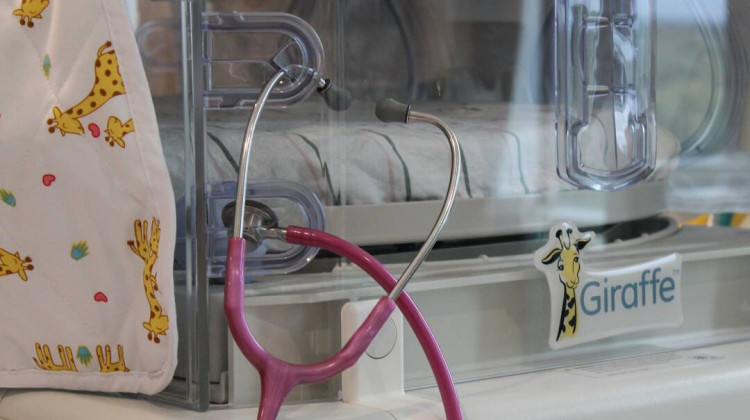
Rachel Jones, a registered nurse at Eskenazi Health's neurosurgery department, is known for her care for patients.
Farah Yoursy/Side Effects Public MediaGrowing up, Rachel Jones wanted to be a teacher. But that changed as she began ironing the uniform her dad wore as a certified nursing assistant.
“He used to take care of people in their homes," Jones said. "And he had ... good stories to tell; they really trusted him.”
In fact, he was so good at his job that a couple families wanted him to relocate with them to other states. Stories like that are what made Jones become a nurse.
Today, Jones is in her thirties and has been working as a registered nurse for nearly a decade. At Eskenazi Hospital’s neurosurgery department, she channels the same passion her dad once did — and her patients, like Stephanie Nelson, can feel it.
When Nelson went to Eskenazi for spine surgery, she was in pain and pretty worried — until she met Jones.
“She would take the time to hold your hand and say, ‘Everything’s going to be alright,’” Nelson said. “You know, and not many nurses are going to take the time, not because they are neglecting you or anything. But they’re busy, they got a lot of people to take care of.”
But no matter how busy Jones was, she always made Nelson feel like she mattered.
“Like you’re a very important person,” Nelson said.
Eskenazi’s neurosurgery clinic is bustling with patients every Monday and Wednesday. There are few “no-shows,” so the waiting area is lined with patients ready to see a surgeon.
That means surgeons work around the clock. And it’s a sign that Jones is doing her job.
It’s not uncommon for clinics to see no-show rates as high as 39%, according to national data. That’s due to a lot of factors, such as patients forgetting about an appointment, having a last-minute conflict or not having transportation.
Jones understands those factors, but she does not let it get in her way. She also knows her patients at Eskenazi are among the most vulnerable, so she puts in extra care and effort.
Dr. Brandon Lane, the attending neurosurgeon at the clinic, sees this everyday. He says it makes his work go seamlessly.
“In many ways [Jones] has more direct exposure to the patients than many of the physicians and other nurses within the department,” Lane said. “Therefore, we are extremely fortunate for her skill and grace in coordinating outstanding care on all fronts.”
For example, when the clinic sends an automated appointment reminder to a patient, Jones follows up with a phone call.
“I always start by asking, ‘How are you doing today?’ And I listen," Jones said. “I will call you and make sure you know where you're supposed to be: ‘You take this elevator, you do this, and you do that.’”
She also tries to get to know the patients, which can give them a sense of ease at a stressful time.
“Typically, I make that connection with them first on the phone," Jones said. "So when they come in, I'm like, ‘Hey, I'm Rachel, we met on the phone,’ and we kind of go from there.”
If Jones discovers something that might affect a patient’s care or health outcomes, she asks permission to share it with their neurosurgeon — and their primary care doctor.
It’s common for physicians to find a note from Jones saying that a patient has just lost a relative or is going through a difficult personal situation.
“Just to let them know they may need some extra TLC,” she said. “The doctors have a lot of work, so I try to make sure they know they need to slow down with this patient.”
Jones’ ability to strike deeper connections with her patients sometimes plays an important role in determining when a patient’s surgery is booked — and even in their post-operation experience.
If a patient can’t get pre-surgery requirements fulfilled — like a COVID-19 test or imaging — Jones explains the situation to colleagues in other departments at Eskenazi. The goal is to fulfill requirements as soon as possible so the patient can have surgery on time.
If it weren’t for such efforts, patients could see their surgeries delayed for weeks or even months due to busy surgery schedules.
Nelson was one of these patients.
Delaying her surgery would have meant living with sharp back pain for an extended period of time. When she finally got her long-awaited surgery scheduled, Jones promised she would visit — even though that’s not part of her job duties.
Knowing how busy Jones is, Nelson told her, “No, you won’t.”
But Jones showed up anyway.
“She checked up on me and was very compassionate,” Nelson said.
And even though Jones does not perform surgeries, it’s not uncommon for her to receive thank you notes from patients.
“I wish there were more people like her,” Nelson said.
 DONATE
DONATE








 Support WFYI. We can't do it without you.
Support WFYI. We can't do it without you.